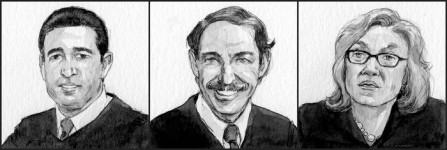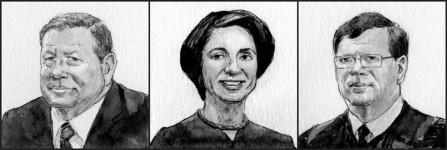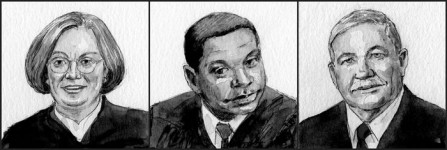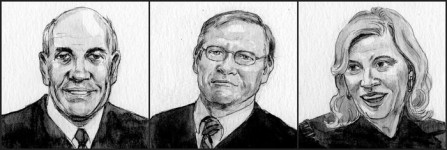131 federal judges broke the law by hearing cases where they had a financial interest
- Details
- Category: Judicial Corruption
- Created: Tuesday, 28 September 2021 20:29
- Written by James V. Grimaldi, Coulter Jones and Joe Palazzolo - Wall Street Journal
 The judges failed to recuse themselves from 685 lawsuits from 2010 to 2018 involving firms in which they or their family held shares, a Wall Street Journal investigation found.
The judges failed to recuse themselves from 685 lawsuits from 2010 to 2018 involving firms in which they or their family held shares, a Wall Street Journal investigation found.
More than 130 federal judges have violated U.S. law and judicial ethics by overseeing court cases involving companies in which they or their family owned stock.
A Wall Street Journal investigation found that judges have improperly failed to disqualify themselves from 685 court cases around the nation since 2010. The jurists were appointed by nearly every president from Lyndon Johnson to Donald Trump.
About two-thirds of federal district judges disclosed holdings of individual stocks, and nearly one of every five who did heard at least one case involving those stocks.
Alerted to the violations by the Journal, 56 of the judges have directed court clerks to notify parties in 329 lawsuits that they should have recused themselves. That means new judges might be assigned, potentially upending rulings.
When judges participated in such cases, about two-thirds of their rulings on motions that were contested came down in favor of their or their family’s financial interests.
In New York, Judge Edgardo Ramos handled a suit between an Exxon Mobil Corp. unit and TIG Insurance Co. over a pollution claim while owning between $15,001 and $50,000 of Exxon stock, according to his financial disclosure form. He accepted an arbitration panel’s opinion that TIG should pay Exxon $25 million and added $8 million of interest to the tab.
In Colorado, Judge Lewis Babcock oversaw a case involving a Comcast Corp. subsidiary, ruling in its favor, while he or his family held between $15,001 and $50,000 of Comcast stock.
At an Ohio-based appeals court, Judge Julia Smith Gibbons wrote an opinion that favored Ford Motor Co. in a trademark dispute while her husband held stock in the auto maker. After she and the others on the three-judge appellate panel heard arguments but before they ruled, her husband’s financial adviser bought two chunks of Ford stock, each valued at up to $15,000, for his retirement account, according to her disclosure form.

Edgardo Ramos, Lewis Babcock, Julia Smith Gibbons
The hundreds of recusal violations found by the Journal breach a bedrock principle of American jurisprudence: No one should be a judge of his or her own cause. Congress first laid out that principle in 1792 to guarantee litigants an impartial judge and reassure the public that courts could be trusted.
Judge Ramos, who oversaw the Exxon case, was unaware of his violation, said an official of the New York federal court, because his “recusal list”—a tally judges keep of parties they shouldn’t have in their courtrooms—listed only parent Exxon Mobil Corp. and not the unit, whose name includes the additional word “oil.” The official said the court conflict-screening software relied on exact matches.
The unit had informed the court at the outset of the case that it was a subsidiary of Exxon Mobil so Judge Ramos could “evaluate possible disqualification or recusal,” a court filing shows.
After the Journal contacted Judge Ramos, who was named to the court by former President Barack Obama, the court’s clerk notified the parties of his stockholding. TIG attorneys asked the court to set aside his ruling and send the case to a new judge because of “the inevitable appearance of partiality.” Exxon opposed assigning a new judge, calling that a “manifest unfairness, gross inefficiency, and waste of judicial resources.” An appellate court has put a hearing on hold until the district court decides what to do.
In the Comcast case, a Colorado couple asked Judge Babcock to issue an order blocking Comcast from accessing their property to install fiber-optic cable. Representing themselves in court, Andrew O’Connor and Mary Henry accused Comcast workers of bullying them, scaring their 10-year-old daughter and injuring their dog, Einstein, allegations the company denied. Judge Babcock, who was appointed to the court by former President Ronald Reagan, ruled the couple had “continually blocked Comcast’s access to the easement.” He sent the case back to state court, as Comcast wanted.
“I dropped the ball,” Judge Babcock said when asked about the recusal violation. He blamed flawed internal procedures. “Thank you for helping me stay on my toes the way I’m supposed to,” he said. A Comcast spokeswoman declined to comment.
Mr. O’Connor, who settled his case in state court, said, “If you are a federal judge, you should not be holding individual stocks.”
Judge Gibbons from the Ford trademark case, appointed to the appeals court by former President George W. Bush, said she had mistakenly believed holdings in her husband’s retirement account didn’t require her recusal. She later directed the clerk of the Sixth U.S. Circuit Court of Appeals to notify the parties of the violation and said that her husband has since told his financial adviser not to buy individual stocks.
“I regret my misunderstanding, but I assure you it was an honest one,” she said.
A spokesman for Ford said: “A fair and impartial judiciary is critical to the integrity of our legal system. In this case, the violation of Ford’s trademarks was clear.”
“I dropped the ball. Thank you for helping me stay on my toes the way I’m supposed to.”
Nothing bars judges from owning stocks, but federal law since 1974 has prohibited judges from hearing cases that involve a party in which they, their spouses or their minor children have a “legal or equitable interest, however small.” That law and the Judicial Conference of the U.S., which is the federal courts’ policy-making body, require judges to avoid even the appearance of a conflict. Although most lawsuits don’t directly affect a company’s stock price, the Supreme Court in 1988 said the law’s purpose is to promote confidence in the judiciary.
Conflict-of-interest rules are common for state and federal employees as well as for lawyers, journalists and corporate executives. U.S. government workers may not participate “personally and substantially” in matters in which they have a financial interest.
The Journal reviewed financial disclosure forms filed annually for 2010 through 2018 by roughly 700 federal judges who reported holding individual stocks of large companies, and then compared those holdings to tens of thousands of court dockets in civil cases. The same conflict rules apply to criminal cases, but large companies are rarely charged, and the Journal found no instances of judges holding shares of corporate criminal defendants in their courts.
It found that 129 federal district judges and two federal appellate judges had at least one case in which a stock they or their family owned was a plaintiff or defendant.
Judges’ stockholdings exceeded $15,000 in 173 cases and $50,000 in 21 of those cases, although under the law, the amount doesn’t matter.
The Journal found 61 judges or their families not only holding stocks in companies that were plaintiffs or defendants in the judges’ courts but also trading the stocks during cases.
Judges offered a variety of explanations for the violations. Some blamed court clerks. Some said their recusal lists had misspellings that foiled the conflict-screening software. Some pointed to trades that resulted in losses. Others said they had only nominal roles, such as confirming settlements or transferring cases to other courts, though there is no legal exemption for such work.
The ethics code for federal judges “requires recusal when a judge has a financial conflict, regardless of the substance of the judge’s actual involvement in the case,” the Judicial Conference’s Committee on Codes of Conduct wrote in a letter to a judge this month.
Some blamed court clerks. Some said their recusal lists had misspellings. Some pointed to trades that resulted in losses.
In response to the Journal’s findings, the Administrative Office of the U.S. Courts said: “The Wall Street Journal’s report on instances where conflicts inadvertently were not identified before a case was resolved or transferred is troubling, and the Administrative Office is carefully reviewing the matter.”
It said the federal judiciary “takes very seriously its obligations to preclude any financial conflicts of interest” and has taken steps, such as conflict-screening software and ethics training, to prevent violations. “We have in place a number of safeguards and are looking for ways to improve,” the office said.
Chief Justice John Roberts, who heads the federal judiciary, didn’t respond to requests for comment.
The nation’s roughly 600 full-time federal trial judges, supplemented by about 460 semiretired jurists called senior judges, wield enormous power. Holding lifetime appointments, they preside over hundreds of thousands of civil and criminal cases each year in 94 court districts.
They have soup-to-nuts control over all elements of their courtrooms, from pretrial process and trial to criminal pleas, judgments and sentencing. Judges have wide latitude for fact findings and evidentiary rulings, most of which can be overturned only for abuse of discretion, a high hurdle.
Violations of the 1974 law almost never become public. Judges’ financial disclosures aren’t online, are cumbersome to request and sometimes take years to access.
Judges are informed if anyone requests to see their disclosures, creating a disincentive for lawyers who might fear annoying judges in whose courtrooms they frequently appear.
Judges rarely make public the lists of companies on whose cases they shouldn’t work. When judges disqualify themselves from cases, they typically don’t disclose details. No judges in modern times have been removed from the federal bench solely for having a financial interest in a plaintiff or defendant that appeared in their courtroom.
“I just blew it. I regret any question that I’ve created an appearance of impropriety or a conflict of interest.”
The Journal analyzed data from the Free Law Project, a nonpartisan legal-research nonprofit that is planning to post judicial disclosure forms online. The findings amount to a pervasive disregard for the judicial conflict-of-interest laws, legal experts said.
A recusal violation in isolation could be viewed as an oversight, but the Journal’s investigation “raises a more systemic problem of judges chronically neglecting their duty to disqualify in such cases,” said Charles Geyh, a law professor at Indiana University, who specializes in judicial conduct, ethics and accountability.
The findings “are both surprising and disappointing,” said Timothy Batten Sr., chief judge of the U.S. District Court for the Northern District of Georgia and a member of the Committee on Codes of Conduct for the Judicial Conference of the U.S.
“I believe in the vast majority of these cases, it is an oversight and indolence,” he added.
Judge Batten himself owned shares of JPMorgan Chase & Co. while he heard 11 lawsuits involving the bank, most of which ended in the bank’s favor, the Journal’s analysis shows.
“I am mortified,” Judge Batten said in a phone interview when notified about his violations, which occurred in 2010 and 2011, before he joined the Codes of Conduct committee in 2019. “I had no idea that I had an interest in any of these companies in what was a most modest retirement account” managed by a broker.
“I just blew it. I regret any question that I’ve created or appearance of impropriety or a conflict of interest,” he said.

Timothy Batten Sr., Janis Sammartino, Rodney Gilstrap
Judge Batten, appointed by former President George W. Bush, said he stopped investing in individual stocks in 2012 and moved his portfolio to mutual funds, which don’t require recusal, and has since closed the account.
The Journal analyzed cases to determine whether judges made rulings on contested motions, such as those seeking dismissal or summary judgment. Judges ruled on contested motions in 21% of the nearly 700 cases in question.
Those rulings favored the judges’ financial interests in 94 cases, went against the judges’ interest in 27 cases and had mixed outcomes in 24 cases.
Already, several parties on the losing side of the rulings have petitioned for a new judge to hear their cases after they were alerted to the violations identified by the Journal.
Several judges misunderstood the law, initially saying that they didn’t have to recuse themselves because their shares were held in accounts run by a money manager.
The ban on holding even a single share of a company while presiding in a case involving the firm means judges must be vigilant. The 1974 law requires judges to inform themselves about their own financial interests and make a “reasonable effort” to do the same for their spouses and any minor children. The Judicial Conference of the U.S. requires courts to use conflict-checking software to help identify cases where judges should bow out.
Judge Janis Sammartino of California traded in stocks of Bank of America Corp. , CVS Health Corp. , Deutsche Bank AG , Hartford Financial Services Group Inc., HSBC Holdings PLC, JPMorgan, Pfizer Inc., Public Storage, Wells Fargo & Co. and Microsoft Corp. while hearing 18 lawsuits involving one or more of those companies, the Journal found. In all, she heard 54 cases involving companies held in her family’s trusts.
In the Microsoft case, a Chicago man alleged the software giant violated the Telephone Consumer Protection Act by sending an unsolicited text about its Xbox gaming console to his mobile phone. He filed suit in 2011. One of Judge Sammartino’s family trusts bought Microsoft stock twice in 2012 and added three purchases in 2013.
The plaintiff’s lawyers sought in 2013 to turn the case into a class action involving 91,708 people who allegedly received the text messages. Microsoft said that it had received permission to send the texts but that records confirming this had been destroyed. Had a class been approved, the case could potentially have cost Microsoft more than $45 million, according to court filings by the plaintiff.
Judge Sammartino denied the class-action motion as well as Microsoft’s motion to dismiss the case. She ruled that the law permitted the plaintiff to seek damages of $500 for one alleged violation, potentially tripled. He appealed but settled before the appeal was heard. A spokesman for Microsoft declined to comment. One of the plaintiff’s lawyers also declined to comment.
Judge Sammartino, an appointee of former President George W. Bush, initially referred questions from the Journal to William Cracraft, a spokesman for the Ninth U.S. Circuit Court of Appeals. “She asked me to let you know” her stocks “are in a managed account, so she’s not seeing as how there could be a conflict,” Mr. Cracraft said. “She’s not inclined to discuss her private business with you since it is all in managed accounts, and she thinks that’s sufficient.”
An opinion by the Judicial Conference’s Committee on Codes of Conduct in 2013 confirmed that judges must bow out of cases involving stocks they own in accounts run by money managers.
Judge Sammartino later informed the court clerk’s office of the conflicts, and the office filed a letter notifying parties to the Microsoft case and other cases with violations identified by the Journal.
“Judge Sammartino was not aware of this financial interest at the time the case was pending,” the letter said. “The matter was brought to her attention after disposition of the case. Thus, the financial interest neither affected nor impacted her decisions in this case. However, the financial interest would have required recusal.”
Before the Journal contacted Judge Sammartino about her recusal violations, she disqualified herself in at least 10 other cases involving companies whose stocks were listed on her disclosure forms, a review of her cases shows.
Judge Rodney Gilstrap, chief of the U.S. District Court for the Eastern District of Texas, had the largest number of conflicts in the Journal’s analysis: 138 cases assigned to him involving companies in which he or his wife held an interest.
Judge Gilstrap said he believed he didn’t need to recuse himself from some cases because they required little or no action on his part, and in other cases because the stocks were in a trust created for his wife. Legal-ethics experts disagreed on both counts.
“I take my obligations related to potential conflicts/recusals seriously,” he said in an email. “Throughout my judicial career, I have endeavored to comply with all such obligations, and I will continue to do so.”
Judge Sammartino’s 54 conflicts were the second-most recusal violations. Brian Martinotti in New Jersey ranked third, handling 44 cases involving companies in which he had invested. Among his biggest holdings was Alphabet Inc., the parent of Google. He disclosed in 2016, 2017 and 2018 that he owned $15,001 to $50,000 of Alphabet shares.

Brian Martinotti, Gershwin Drain, Emily Marks
In 2017, the judge threw out a lawsuit against Google alleging that videos on its YouTube unit falsely said the plaintiff was a sex offender, ruling that the Communications Decency Act let Google off the hook.
Judge Martinotti, an Obama appointee, didn’t respond to requests for comment, but after the Journal inquired, the district court clerk notified parties to 44 cases of Judge Martinotti’s stock ownership. His Alphabet holding didn’t affect the judge’s decisions but would have required recusal, the clerk wrote. A spokesman for Google declined to comment.
“I would like my case to be re-opened as Judge Brian R. Martinotti was unfairly biased and should have recused himself from my case,” the plaintiff, Nuwan Weerahandi, wrote in an August 2021 letter to the court, after receiving notice of Judge Martinotti’s violation.
The chief judge of the New Jersey federal court, Freda Wolfson, denied Mr. Weerahandi’s request on Sept. 2, saying the Communications Decency Act bars defamation-related claims against computer services such as Google.
“Importantly, in making this purely legal determination, Judge Martinotti did not engage in any factfinding that would bear on the credibility of any party, including you,” Judge Wolfson wrote.
In at least 18 instances, judges disqualified themselves over conflicts, only to have the case reassigned to a judge who also had a conflict but didn’t recuse.
In 2015, Judge Robert Cleland in Michigan, a George H.W. Bush appointee, bowed out of a suit by an injured motorist against insurer Allstate Corp. , whose stock the judge had been buying and selling that year.
The case was reassigned to Judge Gershwin Drain, who also owned Allstate shares. Judge Drain heard the case—and six others involving Allstate—and wrote a ruling denying a request by the motorist to move the dispute to state court. The case then settled on undisclosed terms.
Presented with his conflicts in 42 cases, Judge Drain, an Obama appointee, said he had added notices to the court’s public docket for each suit.
“I can say with absolute certainty that I never made any decision in favor of a company because I owned stock and was invested in that company,” Judge Drain said in an email. “To prevent any future issues, however, I have taken steps to review any new cases and if I am invested in any of the companies among the new cases that are assigned to me I will immediately recuse myself.” Allstate didn’t respond to requests for comment. A lawyer for the motorist declined to comment.
Frequent recusals can upset courts’ random drawing of judges for cases and lead to a smaller pool. In 20 federal districts, a third or more judges owned the same stock in the same year. In the U.S. District Court for the Eastern District of Virginia in 2017, fully a third disclosed a Microsoft stock holding.
More than 340 federal appellate and trial judges reported holdings in Apple Inc. at some point from 2010 to 2018 and 300 in Microsoft. About 500 judges owned Bank of America, Citigroup Inc., JPMorgan or Wells Fargo shares at some point.
Those numbers reflect only stock ownership, not recusal violations. However, the Journal found 37 judges who owned a bank stock while improperly hearing a case involving that bank.
Judge Emily Marks bought Wells Fargo stock two weeks after she was assigned a Wells Fargo case, a conflict that now threatens to upset a ruling she made.
In the suit, Jacob Springer and Jeanetta Springer of Roanoke, Ala., acted as their own attorneys in challenging Wells Fargo’s foreclosure of Ms. Springer’s father’s home.
In court filings, they said her ailing father missed a mortgage payment three months before he died, after which his daughter, who inherited the home, made payments. Wells Fargo foreclosed, saying the Springers missed payments of about $4,100 on an outstanding mortgage of more than $80,000; they said they had missed just one $695 payment.
“This is outrageous. How am I supposed to know she owns stock in Wells Fargo?”
Judge Marks, chief judge of the U.S. District Court for the Middle District of Alabama and an appointee of former President Donald Trump, was assigned the case in mid-August 2018. The judge bought Wells Fargo stock at the end of the month. In September, she adopted a magistrate judge’s recommendation to dismiss the Springers’ suit, a decision affirmed on appeal.
Judge Marks declined to comment. The court clerk told parties to the case that the judge had informed her of having owned the bank stock and directed the clerk to notify the parties. The clerk told them Judge Marks’s stock ownership didn’t affect her decisions in the case but would have required recusal.
Mr. Springer said, “This is outrageous. How am I supposed to know she owns stock in Wells Fargo?”
The Springers asked the court to reopen the case, saying in a filing that “a non-interested Judge” might have let them amend their pleadings. The court assigned a new judge to their suit in July. A spokesman for Wells Fargo declined to comment.
The nation’s 94 district courts are organized into 12 circuits, or regions. The Journal identified recusal violations in each region.
The U.S. Supreme Court wasn’t part of the Journal’s analysis. Nor did it include bankruptcy or magistrate judges.
Half of all federal trial and appellate judges in the Journal’s review disclosed minimum financial assets of $775,000 in 2018, while 31 reported a minimum of $10 million of assets. Some jurists joined the bench after lucrative careers in private practice.
Federal district judges draw an annual salary of $218,600, which isn’t much more than a first-year attorney at a top-tier law firm earns. Some judges said their salary level makes stock investments an attractive option.

Susan Webber Wright, Donald Graham, Benjamin Settle
“I have my judicial salary, but the law really restricts what else judges can do for additional income,” said Judge Susan Webber Wright in Arkansas. She said she held more stock when she was younger and trying to build a nest egg for her family.
Judge Wright, an appointee of former President George H.W. Bush, oversaw 2005 and 2006 cases involving Eli Lilly and Co. and Home Depot Inc. while owning shares of those companies. She issued no major rulings before one case settled and the other was transferred to another district.
“A judge has to be on her toes, and obviously I was not,” Judge Wright said.
Judges who have many conflicts are “either being careless or have people working for them who are not exercising due diligence,” she said, though she added that judges bear the ultimate responsibility for steering clear of conflicts.
Judge Donald Graham in Florida held American depositary receipts of Alcatel-Lucent while assigned to a case involving the French telecom maker. He sold the ADRs in 2010, a day after he approved a $45 million civil settlement between the U.S. Securities and Exchange Commission and Alcatel-Lucent over allegations the company bribed foreign officials. The company neither admitted nor denied the allegations.
After being contacted by the Journal, Judge Graham, a George H.W. Bush appointee, notified the court clerk of the violation. In a publicly filed letter to the parties, the clerk said Judge Graham’s holding didn’t affect his decisions.
A lawyer for the SEC told the court the agency didn’t believe any further action was required. Alcatel-Lucent’s current owner, Nokia Corp., declined to comment.
Judge Benjamin Settle in Washington state sold as much as $15,000 of Amgen Inc. stock during a case that was settled in 2012. He sold the stock in 2008, while the suit was under seal, giving him access to nonpublic information about an allegation of kickbacks to doctors. The case contributed to a $762 million penalty against the biotech company in 2012.
Judge Settle, a George W. Bush appointee, said he hadn’t included all of his holdings on his recusal list when he inherited the case in 2007 as a newly commissioned federal judge. “Amgen was among those mistakenly omitted,” he said.
Judge Settle said he directed his broker in 2008 to sell all of his stocks. A spokesman for Amgen declined to comment.
The Journal’s tally of recusal violations is likely an undercount. In Mississippi, Judge Sharion Aycock’s husband owned as much as $15,000 in shares of Dollar General Corp. at a time when the Journal found two cases she heard involving the retailer. After being asked about the matter, Judge Aycock found five more violations involving Dollar General and notified the clerk about all seven.
A few of the judges with violations the Journal identified had legendary careers, including Jack Weinstein and Arthur Spatt in the U.S. District Court for the Eastern District of New York.
Judge Weinstein, a Lyndon Johnson appointee, oversaw four cases involving Medtronic PLC or Target Corp. while he or his family held their shares. Judge Spatt, who was named to the court by former President George H.W. Bush, had a violation involving Johnson & Johnson. Judge Spatt died in 2020 and Judge Weinstein died earlier this year, both having served into their 90s.
Judge Margo Brodie, chief of the Eastern District, which includes New York City’s Brooklyn and Queens boroughs, acknowledged the conflicts but said the judges’ “involvement was minimal, limited to ministerial actions” such as approving settlements or opinions by magistrate judges.
“These two judges have been revered by the practicing bar for their integrity and even handedness,” Judge Brodie said in an email. “There has never been a suggestion, much less an accusation, that either ever acted inappropriately.”
The Journal identified 36 conflicts by one judge in Colorado, R. Brooke Jackson. The cases included Apple, Chevron Corp. , Eli Lilly, Facebook Inc., General Electric Co. , Home Depot, Honeywell International Inc., Johnson & Johnson, JPMorgan, Pfizer and Wells Fargo.
“I have preferred to stay unknowledgeable about it.”
Reached by phone, Judge Jackson said he had no idea which stocks he owns because a money manager handles them and because his wife fills out his disclosure forms. He said that because he doesn’t know, he couldn’t have a conflict of interest.
“I’ve never really paid much attention to it,” Judge Jackson said of his and his wife’s investments. “I have preferred to stay unknowledgeable about it.”
Told he was required to know under the law, he said: “That’s news to me.”
In a later email, Judge Jackson, an Obama appointee, admitted his mistake. “I am taking immediate steps to provide a current list of stocks and other investments held by my wife and by me to our Clerk’s Office so that we can create an appropriate conflicts list and be sure that this does not happen again,” he wrote.
SHARE YOUR THOUGHTS
Does some judges’ ownership of shares in companies in their courtrooms shake your confidence in the courts? Join the conversation below.
In a subsequent 21-page letter to the Journal, Judge Jackson said he should have recused himself in most if not all of the 36 cases.
“I am embarrassed that I did not properly understand and apply the stock ownership rule,” he wrote. “Being informed of what could be viewed as an ethical violation, even a technical one, is no fun.”

R. Brooke Jackson, David Norton, Sharion Aycock
Judge David Norton in South Carolina presided over six asbestos suits beginning in 2012 while his disclosures show he held between $95,004 and $250,000 of stock in two defendants, 3M Co. and GE.
In 2015 he heard a case filed by James Chesher, who alleged that he developed cancer from exposure to asbestos in the Navy. Mr. Chesher and his wife sought damages from 3M, GE and about two dozen other companies. They reached settlements with 3M and GE in 2016.
Mr. Chesher died in 2017. His widow, Cheryl Ann Chesher, was surprised to learn from the Journal of the judge’s financial interest in GE and 3M.
“He should have policed himself,” Ms. Chesher said. “He knows what the law is on that and he should have followed through,” she said, adding: “You have to wonder if he’s looking out for himself...rather than the clients.”
In an emailed statement, Judge Norton said he didn’t recuse himself because 3M and GE played no significant role in the suits and were “defendants in name only.”
He added: “At the outset the lawyers involved in these cases assured me that 3M and GE would be dismissed and not involved in the case pursuant to a pre-existing agreement between the plaintiffs’ lawyers and GE and 3M.”
Peter Kraus, an attorney for the Cheshers, said he and his co-counsel “have no recollection about making any assurances to the judge that GE and 3M would be dismissed.” They “were sued because the evidence in the case implicated them, and were certainly not ‘defendants in name only,’ ” he said, adding that attorneys for both companies participated in depositions.
A 3M spokeswoman said neither the company nor its attorneys ever assured the judge regarding any dismissals. A spokeswoman for GE didn’t respond to questions about whether it had conveyed such an assurance. An attorney for GE said she didn’t recall the case.
Told what 3M and the plaintiffs’ attorney said, Judge Norton reiterated his recollection of the case.
As remaining asbestos defendants moved toward trial, Judge Norton, a George H.W. Bush appointee, issued rulings that broadly benefited companies with asbestos liabilities.
In hearings, he took aim at the theory behind the cases: that any exposure to asbestos was significant enough to contribute to their cancer. The defendants said the plaintiffs’ expert witness shouldn’t be allowed to testify because he was unable to show that the men more likely than not would have avoided the disease but for their exposure to the asbestos. Judge Norton sided with the companies, ruling that the expert witness’s testimony—“scientifically sound as it may be”—couldn’t be presented to a jury.
The ruling drew national attention. Plaintiffs’ lawyers denounced it, while lawyers who often defend corporations embraced it as common-sense analysis. A Harvard Law Review article blasted it, saying that “unrealistic legal expectations of science could do great injustice.”
Mr. Kraus, the Cheshers’s attorney, called the decision out of sync with court precedent on liability in asbestos cases. Other courts have adopted Judge Norton’s analysis, including the Ohio Supreme Court.
Mr. Kraus said he has never asked to see a judge’s financial disclosure form. He said he wasn’t sure he ever would.
“If a judge who is considering a matter you have before him finds out that you’ve been snooping around about his finances, I’d be very concerned as a practitioner that it would cause a negative backlash that would affect my clients’ rights in the court,” Mr. Kraus said.
Judge Norton also violated an ethics rule when he bought a box of cuff links at an auction of the government-seized property of a man he earlier sentenced to prison for a Ponzi scheme, according to the chief judge of the Fourth U.S. Circuit Court of Appeals.
“The judge’s purchase did create an appearance of impropriety,” though it didn’t affect the sentence imposed, Chief Judge Roger Gregory wrote in 2017, without identifying the cuff links buyer.
Judge Gregory quoted the unnamed judge as saying he tried to “keep current on all ethical rules and take the yearly ethics test prepared by the Administrative office” but was unaware that his participation in the auction could create the appearance of impropriety.
Judge Norton, who confirmed in a separate filing that he bought the cuff links, told the Fourth Circuit: “Now that I have been made aware of this, my actions will not be repeated.”
—Ava Sasani and Lisa Schwartz contributed to this article.
—Illustrations by Art Lien for The Wall Street Journal
Write to Coulter Jones at This email address is being protected from spambots. You need JavaScript enabled to view it. and Joe Palazzolo at This email address is being protected from spambots. You need JavaScript enabled to view it.
Copyright ©2022 Dow Jones & Company, Inc. All Rights Reserved. 87990cbe856818d5eddac44c7b1cdeb8
Appeared in the September 29, 2021, print edition as 'Federal Judges Heard Cases Despite a Financial Interest.
Source : https://www.wsj.com/articles/131-federal-judges-broke-the-law-by-hearing-cases-where-they-had-a-financial-interest-11632834421

